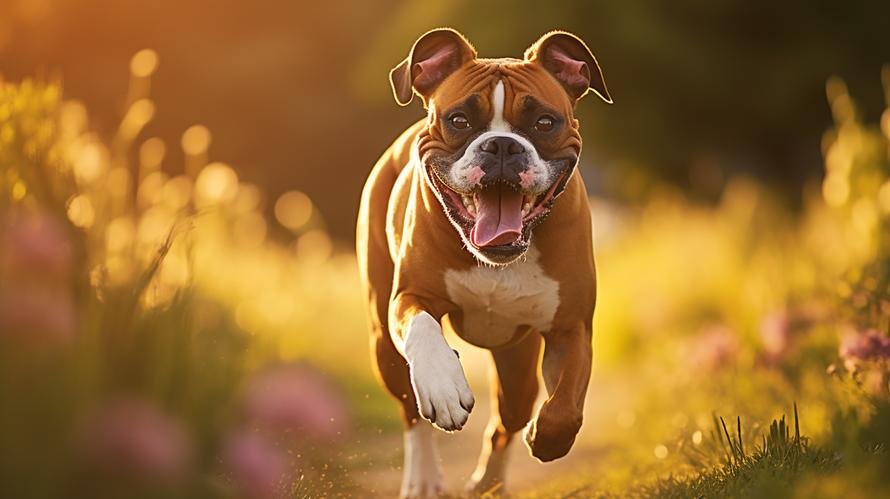Imagine this: You’re home after a long day, sinking into your favorite armchair, when you hear a scratch at the door. You stand up, cautiously approach the door, and on opening it…you’re greeted by a pair of large, caramel eyes set in a muscular, fawn-colored body. Your Boxer dog, with his goofy grin and happily wagging tail, is here to safeguard you and your home from a world of potential threats!
No, this isn’t an excerpt from a bestselling novel. It’s a snapshot of the daily life of countless Boxer owners worldwide! With their unique blend of bravery, intelligence, and affectionate nature, Boxers have swiftly climbed the ranks to emerge as one of the most popular breeds for families and individuals alike.
But do these traits necessarily make Boxers effective guard dogs? You might be surprised to learn that while Boxers have several inherent traits that lend themselves well to protecting their human families, the real answer is a bit more complicated. Read on to find out more.
Boxers: An Intriguing History
Initially bred in Germany in the late 19th century as hunting dogs and bull-baiters, Boxers were always destined to answer to the call of duty. By leveraging their impressive strength, agility, and unyielding bravery, Boxers were soon lending a helping paw in the army, serving as effective messenger dogs, pack carriers, and even attack and guard dogs during World War I and II.
Our modern-day, couch-loving and bed-hogging Boxers surely have an illustrious ancestral lineage. Yet, whether these historical tasks match up with their current potential as home protectors is a story waiting to be uncovered.
Boxers as Guard Dogs: It’s in their DNA!
Choosing a guard dog is no simple task, and it certainly means more than selecting a breed known for its intimidating appearance or booming bark. In reality, the efficacy of a guard dog boils down to their temperament, training, and instinctual behavior.
The good news is, Boxers tick most of these boxes. They possess an exceptional degree of bravery that complements their keen intelligence. Their instinct to protect their families from perceived dangers is innate and can be seen even in Boxer puppies who may not hesitate to stand up against a bigger, scarier dog if they sense their human is in danger!
Furthermore, their natural agility and strength make them formidable protectors. These athletes of the dog world can navigate challenging environments and respond quickly to threats – a trait indispensable in any guard dog.
Boxers also have a distinct ‘wariness of strangers’. While they are not naturally aggressive, Boxers are usually reserved around people they do not know. This can be a valuable trait in a guard dog. They won’t likely be lured away or easily distracted by a stranger, maintaining their focus on safeguarding their home and family.
Playing the Devil’s Advocate: Boxers and Their Flip Side
Understanding the potential of Boxers as guard dogs wouldn’t be complete without a fair look on the other side of the coin. Boxers, despite their many desirable qualities, have a few traits than can hamper their abilities as reliable guard dogs.
For one, Boxers are known for their playful, almost clownish demeanor. They are high-energy dogs who sometimes seem stuck in a permanent ‘puppyhood’ phase. This boundless energy, coupled with their penchant for play, may make them a bit less focused than other breeds who are laser-pointed towards their guard duties.
Secondly, Boxers are incredibly affectionate and family-oriented. While this makes them fantastic companions, it also means that they may become emotionally stressed or anxious if left alone for long periods. This can interfere with their guard duties, especially for individuals who frequently travel or have demanding work hours.
Let’s Not Forget About Training
Like any other breed, the proficiency of a Boxer as a guard dog largely depends on consistent, gentle, and early-age training. Boxers are naturally inclined to protect, but channeling this inclination into effective guarding behavior requires professional training.
In the Boxer’s case, their high energy levels, combined with their intelligent yet stubborn nature, demands an experienced trainer who understands the breed’s quirks and motivation tactics.
Given their willingness to please their human companions, Boxers respond well to positive reinforcement training methods. Treats, praises, or a good ol’ belly rub can do wonders in keeping your Boxer motivated during obedience and guard dog training sessions.
Making the Final Decision
So, perhaps the question we should be asking isn’t “Is a Boxer a guard dog?”. Rather, we need to probe “Is a Boxer the right guard dog for me?”.
If your lifestyle allows for a high-energy, affectionate dog who requires consistent physical and mental stimulation, then a Boxer might indeed make a loyal, reliable guard dog for you.
Remember, the Boxer is not a breed that can be relegated to the backyard, left to its own devices. These are dogs who will want to share your couch, your family time – essentially, every aspect of your life. If properly trained, their protective instincts will shine through, adding a layer of safety to your home.
Simply put, with a Boxer, you’re not just gaining a guard dog. You’re inviting a bundle of joy, love, and relentless energy into your life – a loyal friend who just happens to also take their guard duties seriously!
As always, making an informed decision requires comprehensive research. So take your time, consider your lifestyle, consult with breeders and trainers, and ask yourself if you’re ready for the long-term commitment of having these amazing dogs enrich your life.
Bear in mind, every dog, like every human, is unique. Thus, consider the traits and requirements we’ve discussed here as guidelines, not rules set in stone. With love, patience, and the right training, a Boxer can indeed become your best friend and your loyal protector.



